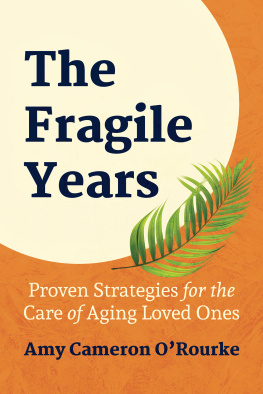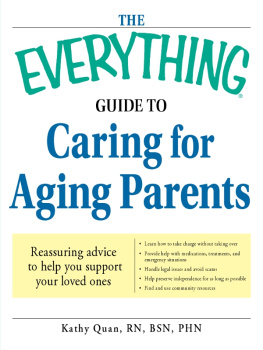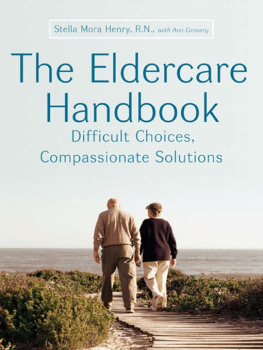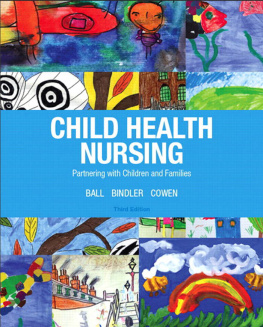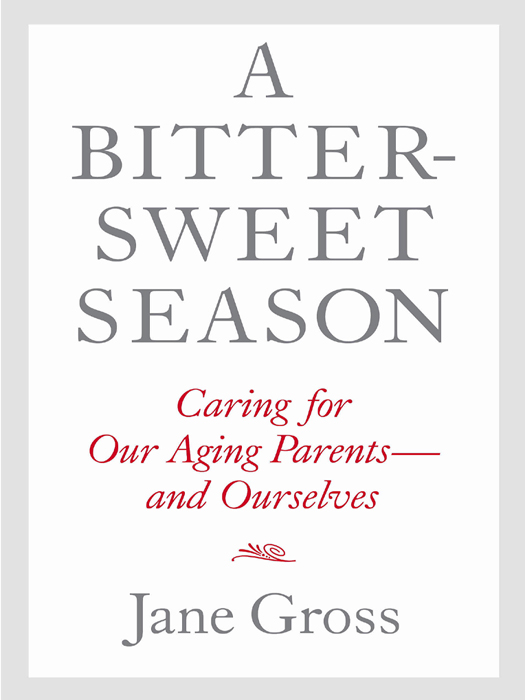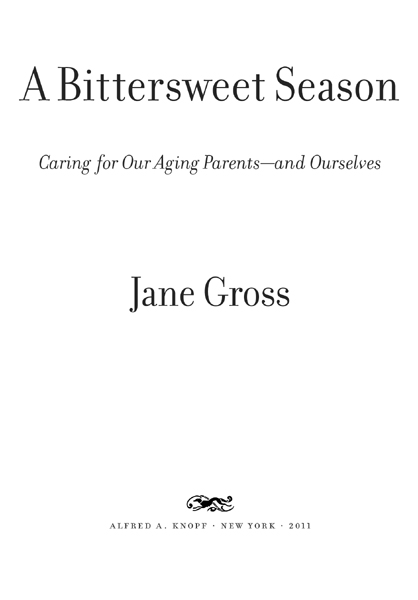THIS IS A BORZOI BOOK
PUBLISHED BY ALFRED A. KNOPF
Copyright 2011 by Jane Gross
All rights reserved. Published in the United States by Alfred A. Knopf, a division of Random House, Inc., New York, and in Canada by Random House of Canada Limited, Toronto.
www.aaknopf.com
Knopf, Borzoi Books, and the colophon are registered trademarks of Random House, Inc.
The New Old Age blog on which some of this work is based originally appeared on www.nytimes.com, and to the extent it is reprinted here, it is reprinted with permission. Inquiries concerning permission to reprint any blog or portion thereof should be directed to The New York Times Company, News Services Division, The Times Agency, 620 Eighth Avenue, New York, New York 10018. The New Old Age blog is a trademark of The New York Times Company and is used under license.
Library of Congress Cataloging-in-Publication Data
Gross, Jane.
A bittersweet season : caring for our aging parents and ourselves / Jane Gross.
p. cm.
eISBN: 978-0-307-59668-0
1. Aging parentsCareUnited States. 2. Adult children of aging parentsFamily
relationshipsUnited States. 3. Gross, JaneFamily. I. Title.
HQ1063.6.G74 2011
306.8740973dc22
2011007079
Jacket design by Barbara de Wilde
v3.1_r1
For Michael: The eagle has landed
I have seen in you what courage can be when there is no hope.
M AY S ARTON , As We Are Now
CONTENTS
AUTHORS NOTE
This book reflects the experiences of an upper-middle-class family, blessed with financial and professional resources that made our journey easier. I have tried to direct readers in different circumstances to affordable services but am mindful that I am not capable of fully understanding how difficult their experience may be. I have purposefully not delved into Alzheimers disease in more than a glancing way because, of all aspects of aging and caregiving, it has the richest literature of its own, written by those with firsthand knowledge, which I do not have.
The places where my mother lived in the final years of her life are all identified by name. If I could locate the professionals who took care of her in her final years and obtain their permission to use their real names, I have done so. I interviewed most of them to confirm, or correct, my memory of events. Where quotation marks are used, these sections come from verbatim conversation. Where quotation marks are not used and dialogue appears in italics instead, this reflects a reconstruction based on my best recollection.
Portions of this book have been vetted for accuracy by experts in the field. My brother has read the sections about our family. Where our memories differ, he helped me figure out whose was accurate. He often views events through a different emotional lens and had different relations than I did with the dramatis personae. This is my version, but never factually at odds with what he experienced.
J.G., January 2011
PROLOGUE
Finding Our Better Selves
T he day I started writing this book, I spent hours commiserating by telephone with three friends who were being turned upside down by the needs of their aging parents.
One lived a short distance from her mother, who was in precarious health, bouncing back and forth between home and hospital, unwilling to consider a retirement community or nursing home. For months, without time to rest and regroup, my friend, herself nearing the end of a fatal illness and keeping it from her mother, had managed a series of medical and home care emergencies. She was running on empty.
The second friend, rocked by the financial strains and childrearing conflicts that often follow divorce, had largely abdicated to his siblings the demands of long-distance supervision of two increasingly disabled parents, one lost in the fog of Alzheimers disease and the other plagued by stress pain and the broken bones of osteoporosis. When my friend tried to do his fair share of the work, he was overwhelmed. When he didnt try, he was conscience-stricken.
The third friend was considering making a cross-country move to be closer to his mother, who was then past ninety and losing her customary verve. Driving had become risky, and her once-daily walks to the store or the library were just too much sometimes, now that simply dressing or preparing meals took so much energy. My friend knew his mother needed more from him than three-times-a-day phone calls. And he wanted more from her as their time together dwindled.
Before that day was over, I had also spoken to each friends mother, as I do regularly, since all of them are dear to me. What they had to say, unbidden, was the flip side of my earlier conversations with their children. These three strong-willed old women were grateful for their childrens devotion but resistant to giving up the reins. They were embarrassed by their own diminished capacity and frightened of what lay ahead, but nothing was worse, they said, than being a burden. Like my mother, who died in 2003, they fought dependence, even as it became inevitable.
All of my conversations served as a fitting reminder that we stand at an unprecedented demographic crossroads. Never before have there been so many Americans over the age of eighty-five. Never before have there been so many Americans in late middle age, the huge baby boom cohort, responsible for their parents health and well-being. Most often, neither the aged parents nor the adult children are prepared for this long, often tortured, time in life, or for these role reversals, which are unanticipated, unwelcome, and unfamiliar. How do we become our parents parents without robbing them of their dignity? How do they let us? How do we collaborate with our siblings, leaving behind any baggage we may have with them, or manage on our own if we are only children?
The task is to get through it with grace, mindfulness, and good sense: to do the very best we can for our parents without sacrificing the lives weve built for ourselvesour families, our jobs, and our own financial future, which is the last thing theyd want us to do. But how do we know when its still appropriate to aggressively pursue medical care, try to fix everything thats broken, and restore our parents to a measure of health, vitality, and dignity? How do we know when, logistically and financially, we must break a solemn promise not to put them away (and how do we forgive ourselves for doing it, if we must)? How do we know when the time for heroics has passed? Our parents may have escaped earlier threats to their healthstrokes, cardiac events, cancerand lived longer than any generation before them, but eventually some things are just going to wear out. Their death certificates will say they died of heart failure or diabetic complications or respiratory failure, because the government has decreed that old age is not an acceptable cause of death. I beg to differ. At a certain point, the wheels simply fall off the bicycle.
So here we are, not just with a herculean job but with a front-row seat for this long, slow dying. We want to do all we realistically can to ease the suffering, smooth the passing, of our loved ones. But we also have the opportunity to watch what happens to our parents, listen to what they have to say to us, and use that information to look squarely at our own mortality and prepare as best we can for the end of our own lives. In fact, we have the opportunity to become better people, wiser and stronger, not simply older and grayer. We can make something of this crisis, or we can endure the experience until its over and then escape back into the daily buzz of our lives until suddenly its our turn.


